Trust in the technology industry has crashed to an all-time low based on the 2021 Edelman Trust Barometer.
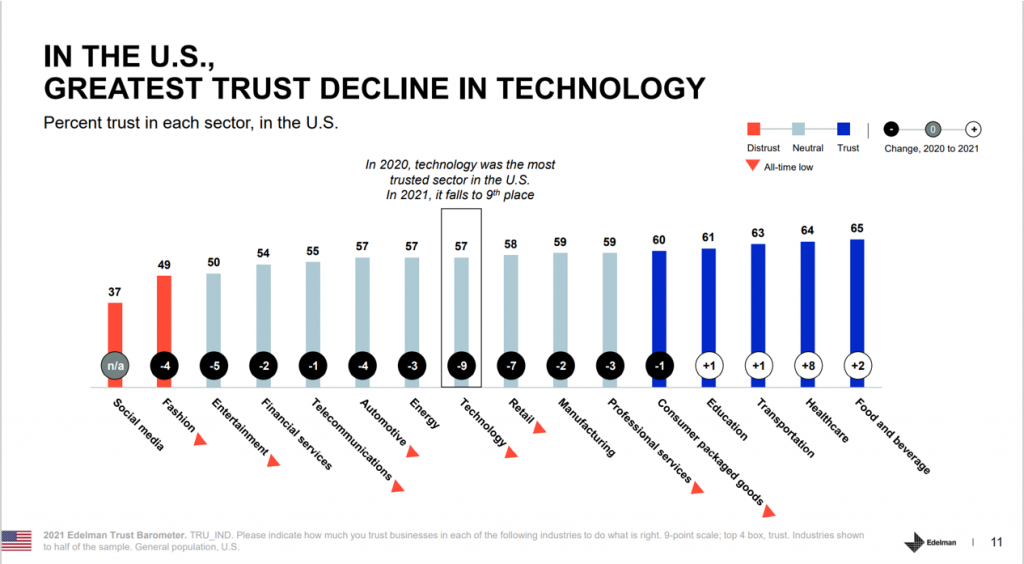 As Richard Edelman, CEO, concisely asserted, “Tech loses its halo.”
As Richard Edelman, CEO, concisely asserted, “Tech loses its halo.”
The first chart shows the one-year trend on trust across industries through U.S. consumers’ eyes. Most industries lost citizens’ trust between 2020 and 2021, most notably,
- Technology, dropping the greatest margin at 9 points
- Retail, falling 7 points,
- Entertainment. falling 5 points, and,
- Fashion and automotive declining by 4 points.
Several sectors’ trust equity rose in the year, especially healthcare growing by 8 points and food and beverage rose slightly by 2 points.
Overall, the most-trusted industries in 2021 were food and bev, healthcare, transportation, education, and consumer packaged goods, all garnering over 60 points in trust-by-sector.
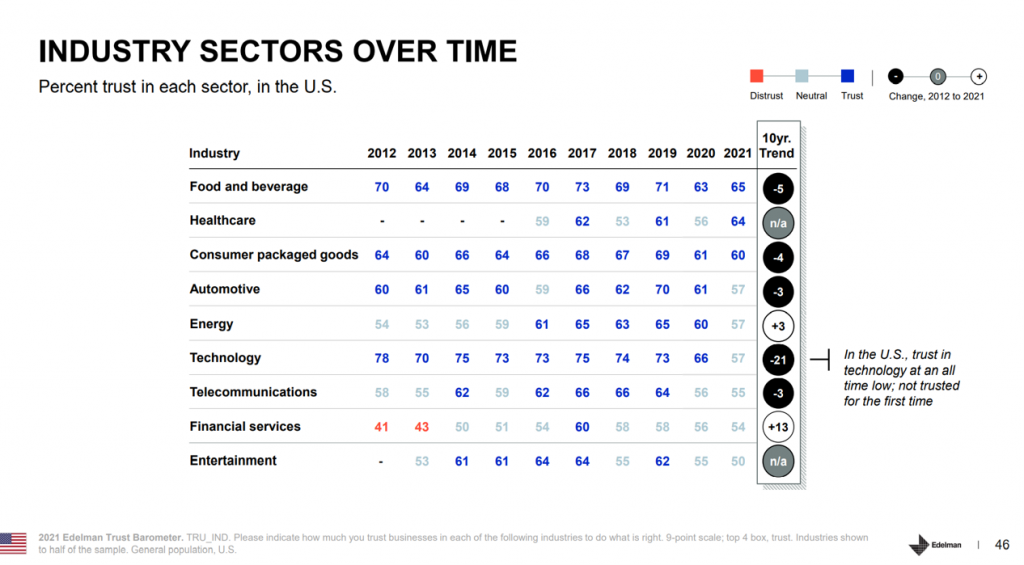 The technology decline is very dramatic relative to other industries seen over time.
The technology decline is very dramatic relative to other industries seen over time.
The second chart shows this phenomenon. With a double-digit trust decline of 21 points over ten years, technology trust was the lowest ever in the U.S. in 2021. Edelman notes that this year represents the first year that the technology industry was not trusted for the first time.
Healthcare experienced a bounce in the one year 2020-21, rising from 56 points of trust among U.S. consumers in 2021 into the positive zone of 64 points, just one point behind food and beverage (an industry which is fundamentally at the base of every human’s Maslow Hierarchy of [Basic] Needs, coming through for people during the Year of COVID).
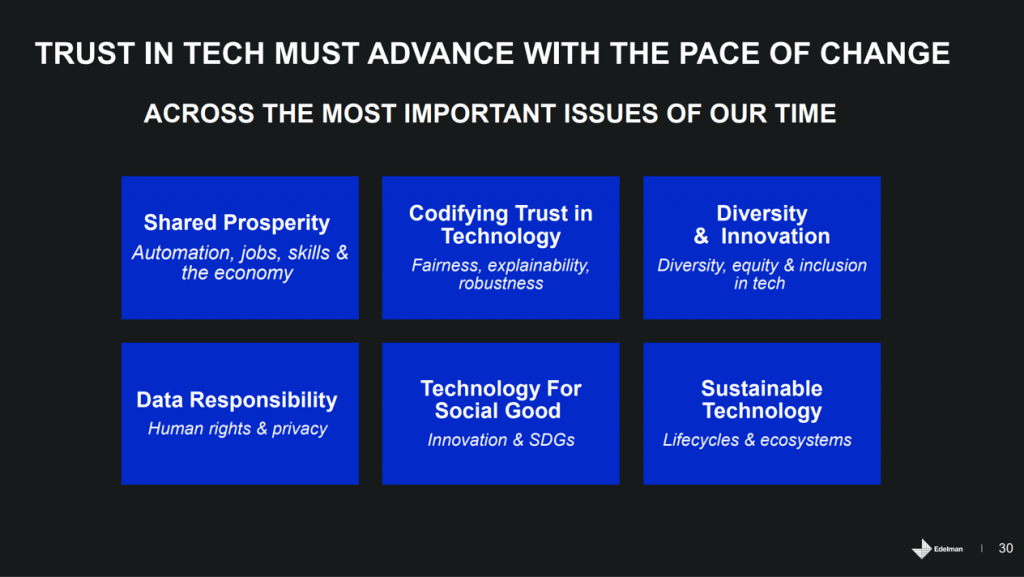
By mid-2020, Edelman detected, “a decline in willingness to share personal data to fight the pandemic. During the height of the pandemic, there was a predisposition to give up personal health and location tracing data to government to help control the spread of the disease. Now barely more than half are willing to do so…
“The tech industry is now being held to account for all manner of societal ills, from information bankruptcy, to job loss, to human rights, to the mass-class divide.”
How to address the trust-busted technology industry? Edelman offers six tactics to address, including,
- Shared prosperity
- Codifying trust in technology through transparency and fairness
- Diversity, equity, innovation, and inclusion
- Data responsibility, embracing data as a civil right and privacy baked therein
- Tech for social good, and
- Sustainable tech with an ecosystem view.
For the U.S. study, Edelman interviewed 1,500 U.S. adults post-election between December 14th and 18th 2020.
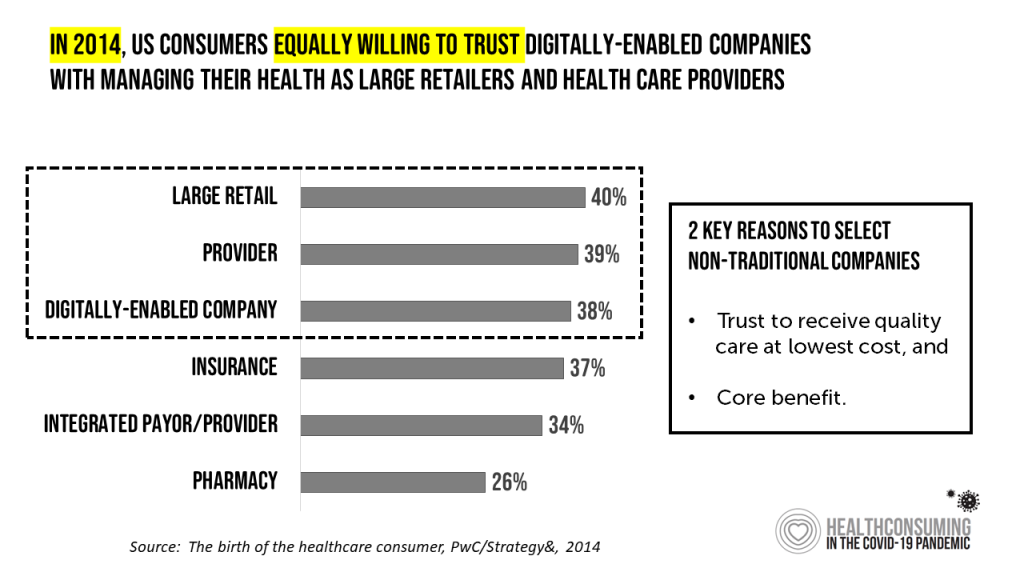 Health Populi’s Hot Points: This 21-year low for the tech industry has implications for health care as digital health technology blurs into everyday healthcare the way “e-business” and the Internet melted into our daily work and personal life-flows.
Health Populi’s Hot Points: This 21-year low for the tech industry has implications for health care as digital health technology blurs into everyday healthcare the way “e-business” and the Internet melted into our daily work and personal life-flows.
What a difference seven years makes, with the latter years book-ended by the Facebook/Cambridge Analytica event and the global coronavirus pandemic.
This last chart from a 2014 PwC/Strategy& report on the birth of the healthcare consumer is data I often turned to as U.S. consumers became increasingly comfortable with “digitally-enabled companies” — say, Amazon, Apple, Google, and Microsoft — to help manage personal health.
Equal numbers of people in the U.S. came to trust digitally-enabled companies for managing health as large retailers and health care providers.
When I shared these data points with hospitals and clinicians they were first stunned at the finding.
Then we moved to the right side of the chart, pointing to the two main reasons health consumers would select the non-traditional companies for managing health: trust in receiving quality care at a lower cost, and ability to articulate, with transparency, the core benefit of the value-proposition to the consumer.
Retailers and digital companies could deliver on both of those, in the health consumer’s eyes.
By the middle of 2020, as Edelman noted the sharp decline in trust for tech companies, consumers-as-health-citizens’ trust in sharing data in the COVID-19 pandemic for contact tracing and tracking tumbled. Ironically, the more people share data in a public health crisis, the more that information can be used for good to, in the case of the coronavirus, test, track, and snuff the virus.
As so much of our health and health care depends on digital platforms and tools, and we generate data useful for our personal, community, and public health, we can take some advice from Edelman in the six prescriptions shown above in the black-and-blue chart. Health disparities, continued digital divide, health inequities, are unsustainable if we prioritize advancing public health. Trust underpins health engagement, especially critical in a public health crisis. In this instance, technology isn’t just for social good — it’s imperative for our individual health, we’ve learned all too well in the COVID-19 pandemic.


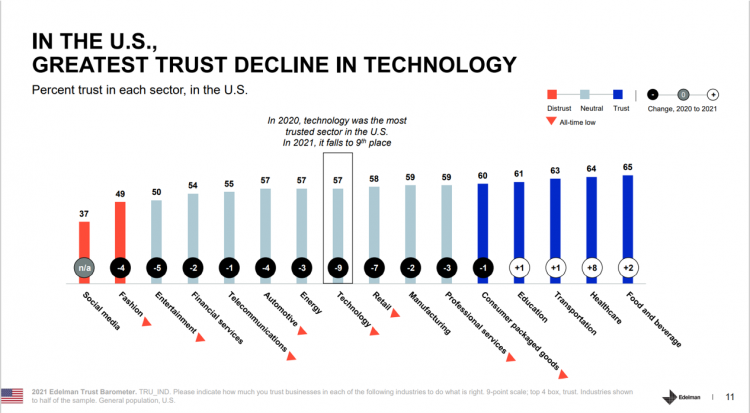


 Interviewed live on BNN Bloomberg (Canada) on the market for GLP-1 drugs for weight loss and their impact on both the health care system and consumer goods and services -- notably, food, nutrition, retail health, gyms, and other sectors.
Interviewed live on BNN Bloomberg (Canada) on the market for GLP-1 drugs for weight loss and their impact on both the health care system and consumer goods and services -- notably, food, nutrition, retail health, gyms, and other sectors. Thank you, Feedspot, for
Thank you, Feedspot, for  As you may know, I have been splitting work- and living-time between the U.S. and the E.U., most recently living in and working from Brussels. In the month of September 2024, I'll be splitting time between London and other parts of the U.K., and Italy where I'll be working with clients on consumer health, self-care and home care focused on food-as-medicine, digital health, business and scenario planning for the future...
As you may know, I have been splitting work- and living-time between the U.S. and the E.U., most recently living in and working from Brussels. In the month of September 2024, I'll be splitting time between London and other parts of the U.K., and Italy where I'll be working with clients on consumer health, self-care and home care focused on food-as-medicine, digital health, business and scenario planning for the future...